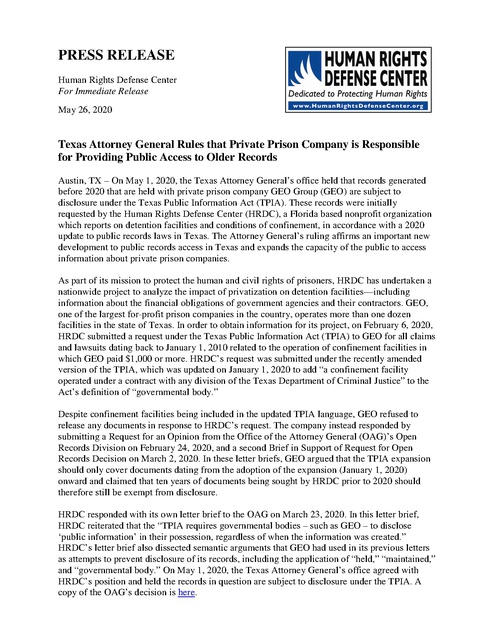Texas Attorney General Rules that Private Prison Company is Responsible for Providing Public Access to Older Records
Texas Attorney General Rules that Private Prison Company is Responsible for Providing Public Access to Older Records
Austin, TX – On May 1, 2020, the Texas Attorney General’s office held that records generated before 2020 that are held with private prison company GEO Group (GEO) are subject to disclosure under the Texas Public Information Act (TPIA). These records were initially requested by the Human Rights Defense Center (HRDC), a Florida based nonprofit organization which reports on detention facilities and conditions of confinement, in accordance with a 2020 update to public records laws in Texas. The Attorney General’s ruling affirms an important new development to public records access in Texas and expands the capacity of the public to access information about private prison companies.
As part of its mission to protect the human and civil rights of prisoners, HRDC has undertaken a nationwide project to analyze the impact of privatization on detention facilities—including information about the financial obligations of government agencies and their contractors. GEO, one of the largest for-profit prison companies in the country, operates more than one dozen facilities in the state of Texas. In order to obtain information for its project, on February 6, 2020, HRDC submitted a request under the Texas Public Information Act (TPIA) to GEO for all claims and lawsuits dating back to January 1, 2010 related to the operation of confinement facilities in which GEO paid $1,000 or more. HRDC’s request was submitted under the recently amended version of the TPIA, which was updated on January 1, 2020 to add “a confinement facility operated under a contract with any division of the Texas Department of Criminal Justice” to the Act’s definition of “governmental body.”
Despite confinement facilities being included in the updated TPIA language, GEO refused to release any documents in response to HRDC’s request. The company instead responded by submitting a Request for an Opinion from the Office of the Attorney General (OAG)’s Open Records Division on February 24, 2020, and a second Brief in Support of Request for Open Records Decision on March 2, 2020. In these letter briefs, GEO argued that the TPIA expansion should only cover documents dating from the adoption of the expansion (January 1, 2020) onward and claimed that ten years of documents being sought by HRDC prior to 2020 should therefore still be exempt from disclosure.
HRDC responded with its own letter brief to the OAG on March 23, 2020. In this letter brief, HRDC reiterated that the “TPIA requires governmental bodies – such as GEO – to disclose ‘public information’ in their possession, regardless of when the information was created.” HRDC’s letter brief also dissected semantic arguments that GEO had used in its previous letters as attempts to prevent disclosure of its records, including the application of “held,” “maintained,” and “governmental body.” On May 1, 2020, the Texas Attorney General’s office agreed with HRDC’s position and held the records in question are subject to disclosure under the TPIA. A copy of the OAG’s decision is here.
“Private prisons have a long history of corruption and fraud which is perpetuated by a lack of transparency. Concealing the expenditure of tax payer dollars deprives the public of knowledge about how well or poorly their tax money is being spent. The Attorney General’s office recognizes the importance of transparency around the private prison industry,” said HRDC executive director Paul Wright.
“We welcome the Attorney General’s plain text reading of the Texas Public Information Act that gives effect to the Legislature’s intent to make these types of documents public,” added Tom Leatherbury, partner at Vinson & Elkins in Dallas, Texas, “This increased transparency into the for-profit prison industry is a victory for all Texans.”
The March 23 letter brief to the Office of the Attorney General of Texas, written by attorney Tom Leatherbury from Vinson & Elkins on behalf of HRDC, is available here.
_____________
The Human Rights Defense Center, founded in 1990 and based in Lake Worth, Florida, is a
non-profit organization dedicated to protecting human rights in U.S. detention facilities. HRDC publishes Prison Legal News (PLN), a monthly magazine that includes reports, reviews and analysis of court rulings and news related to prisoners’ rights and criminal justice issues. PLN has subscribers nationwide and operates a website (www.prisonlegalnews.org) that includes a comprehensive database of prison and jail-related articles, news reports, court rulings, verdicts, settlements and related documents. HRDC also publishes Criminal Legal News, which reports on criminal law and procedure, law enforcement and policing, sentencing and habeas corpus and news. (www.criminallegalnews.org).
For further information, please contact:
Paul Wright, Executive Director
Human Rights Defense Center
(802) 275-8594
Tom Leatherbury, Partner
Vinson & Elkins
(214) 220-7792







